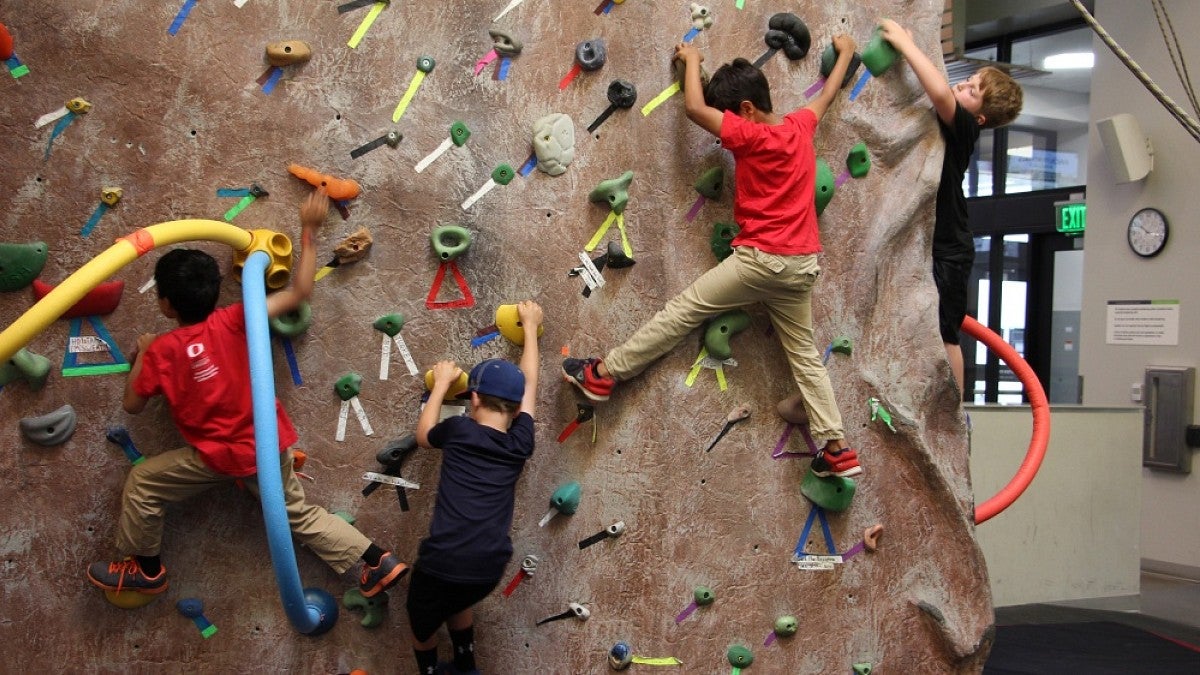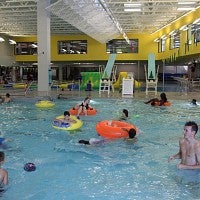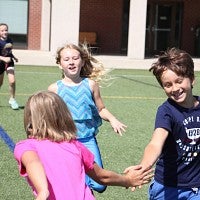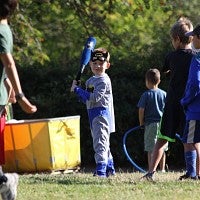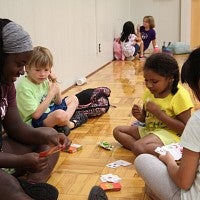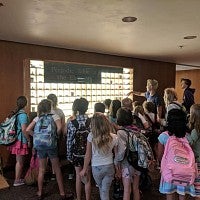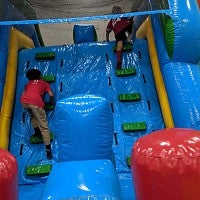With upbeat pop tunes kicking a background soundtrack on a gorgeous summer morning, dozens of kids play soccer, hone their hula-hooping skills and battle each other in myriad board games on the lawn adjacent to Gerlinger Hall.
This is Duck Trails day camp, and it’s just the start of what will be a jampacked day full of fun activities for the 130-plus campers.
The popular camp fills up quickly, particularly with children of faculty and staff looking for a convenient outlet to keep their kids occupied when school is out. But it’s enriching, too.
The kids take part in a mix of activities that keep them active and away from a TV or computer screen. Arts and crafts, obstacle courses, swimming, rock climbing and games of all sorts fill up each day’s schedule.
“My kids come home exhausted and completely pumped at the same time,” said Sandra Anderson, who works for the UO Foundation. “They love that they get to go to the Rec Center and play in the pool and rock climb. They come home with stories about the crafts that they did.”
Indeed, when asked their favorite activities, Anderson’s daughter, Kassy, touted the crafts: “It’s really fun. We made these O’s for Oregon, and I made mine into a flower.” But her son Wyatt voted for swimming: “I like the diving board.”
Duck Trails offers the Classic Camp for younger kids, as well as Sports Camp and Imagination Factory. For kids 11 to 14, there’s Climbing and Outdoor Adventure Camp, EmpowerU for girls, and Sports Academy, a new addition this year. High-schoolers can take part in the Junior Counselor program, where they get a week of training and then can volunteer at the camp.
There’s also camps during no-school days as well as over holiday and spring breaks.
“We’ve done other camps around town and when she did the spring break camp, she said she doesn’t want to do any other camps,” Elizabeth Peterson said of her daughter, Esme. “She was like, ‘I want to swim every day and play games and make crafts.’”
There’s little doubt that the camp is a unanimous hit with the kids. Swimming and rock climbing were the most-often cited favorites, but the other activities were close behind.
“My favorite part this year is the all-camp game,” said Oliver Chadwick, whose mother, Amy Grainger, works in the Division of Student Services and Enrollment Management. “It’s when most of the camp gets together and plays a fun game, and if you don’t want to do the game, you can sit in this room where there’s games and stuff. Sometimes we play dodgeball, kickball, basketball …”
“Today there was a game with a beach ball,” chimed in his sister, Isadora.
“Beach ball soccer,” noted Oliver.
Several parents liked the idea of having their child in a college setting with counselors who are students themselves.
“It exposes the kids to higher education in the sense that they’re connecting with people who are actively enrolled and pursuing their dreams,” said Ellen Grant, whose son, Porter, was a Duckateer in Classic Camp.
Parents consistently praised the competency and enthusiasm of the counselors.
“The counselors are phenomenal, so wonderful, they take such good care of us, all of us,” said Sandra Anderson, echoing a common theme.
Sam Wallace, the director of the camp, enjoys hearing feedback like that.
“They’ll say, ‘It’s great for my daughter to see other females in college going for STEM things,’” said Wallace, whose official camp name is Meeko, referring to science, technology, engineering and math subjects. “I love passing that on to them. That’s an impactful thing that they remember.”
It’s a competitive process to get hired as a counselor, all of whom must be current students or recent grads. Most have ties to the university.
Wallace and her team began planning in January, and when registration opens in March with an open house, a majority of the spots quickly get gobbled up.
As many as 160 campers take part each week, and each day has up to eight activities.
“It’s a routine, but not necessarily repetitive,” Wallace said. “And with each activity, there are options going on there, too.”
The camps also provide excellent opportunities for students who might be eyeing a job in teaching or recreation to get solid experience for their resumé. Wallace and her PE and recreation colleagues help the students articulate the camp experience on their resumé.
“We help to show it’s not just playing games, it’s not just getting dodgeballs out,” Wallace said. “It’s risk management, safety, group management behavior, handling behavior issues, handling conflict, working with a large staff, working one-on-one with a partner. That’s applicable for pretty much any job.”
It’s not an easy job. Counselor Brendan Amesbury, aka Zephyr, said he regularly logs 20,000-step days on his pedometer, with a personal best of around 37,000 steps.
“You’re on your feet all day, you’re running around, but at the end of the day when the kids are saying goodbye and still smiling, and they don’t want to leave, that’s what makes it all worth it,” he said. “I know I’m tired, but that’s what we’re doing it for.”
It’s a lot of work, but it’s also a lot of play.
“It’s probably the most fun job I’ve ever had,” said Casey Zottola, aka ZigZag, who graduated with a degree in psychology last spring. He is looking for a job in recreation that will let him continue to work with youth. “Obviously, you have responsibilities, but you forget about that really quick when you are running around playing games.”
At the end of each day, the kids head to McArthur Court, where they play informal games or just chill out while waiting for their parents to pick them up. As they walk out, the counselors manning the sign-out desk all wave and say goodbye to each camper by name.
The farewells are enthusiastically returned — “Bye, Grizzly! Bye, Zephyr!” — and the smiles on the campers’ faces show the day was a success.
“You know it’s a sign of a good day when you drop your kids off and they run away to go play,” said Sandra Anderson, “and then when you come to pick them up and they’re: ‘You’re here already!?’”
—By Jim Murez, University Communications


